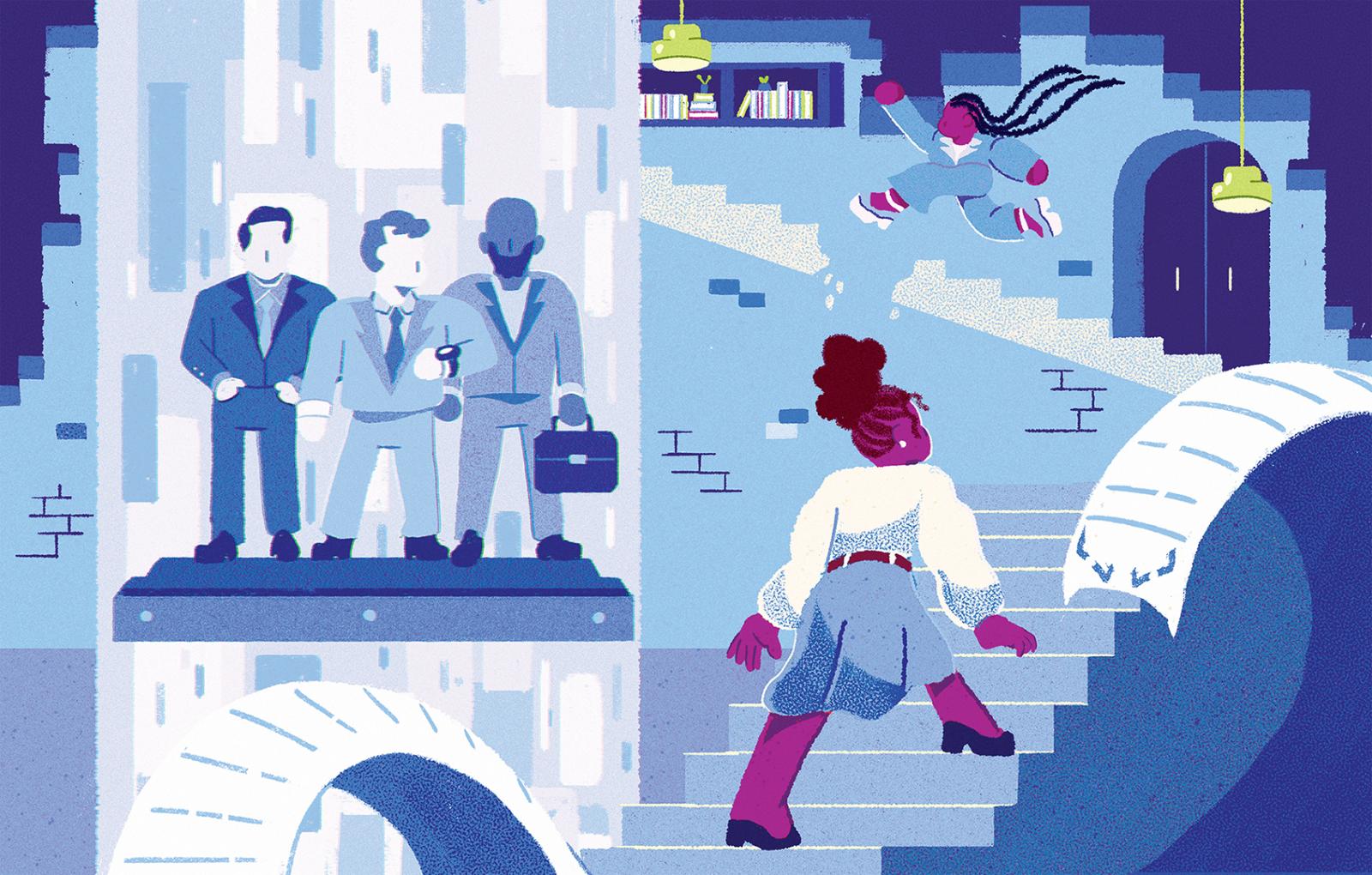In fact, Streeter experienced several more negative incidents that she attributes to her race and gender. Streeter, a former chief financial officer, tells a story of going to lunch with her team, a group of white males.
One of her team members told a friend who stopped by, “I’m out with my boss and my team.” The friend looked at the other white men to see which one was the boss. The employee said, “no, she’s my boss.” The friend seemed shocked when he said “You work for her?” The employee quit weeks later. “I had to believe it was because of peer pressure from his friend,” Streeter says.
Another time, she sat at the secretary’s desk looking for something. A white man who reported to her said, “Oh, I see they finally put you in your place.”
He said he was joking when Streeter questioned him, but she had felt that attitude from him before. She escalated the incident to her boss. “I had a supportive male boss who agreed with me and we let that person go.”
Barriers, Road Blocks, and Obstacles
Doubting Black women and questioning their work adds to the stress they experience on the job. This can further impede their career progress, experts say.
“We can’t be afraid to stand up for ourselves. Be bold, not bashful,” says Streeter, who teaches her students how to succeed in corporate environments. She adds, “One has to know that you are good at what you do and you belong there to do it. We are not seeking permission to be in corporate spaces. Don't look around for the barriers, just focus on achieving your goals and helping others to do the same. At an HBCU, we not only teach you the content, we teach you how to navigate and how to express that you understand the content,” Streeter says.
Cyntoni Miller, who attended Howard in 2008, first truly understood the disparities Black women face when she worked in California as a recruiter for universities. Miller earned very little at the time, $9 per hour and sold plasma when she needed extra money. She found herself surrounded by Black women in similar circumstances—not quite making it.
The realization was underscored when Miller says she interviewed a well-qualified Black woman for a position that paid $112,000.
Miller, who was raised in Compton, California by her grandmother while in foster care, says she planned to offer the job to this woman who held a master’s degree. Her boss, however, for the first time didn’t want to go with Miller’s choice. He wanted to offer the job to another candidate, who did not have a master’s degree, because their resume looked better, Miller says.
We are not seeking permission to be in corporate spaces.”
With the Black applicant’s permission, Miller revamped her resume, landing the woman the job. That experience reinforced for Miller that even when Black women have better qualifications, they still face a multitude of road blocks.
This incident made Miller grow more frustrated with lower salaries offered to Black women, comments about how they speak and even scrutiny about how Black women wear their hair. Miller began sharing resume, interview and career advice online to help Black people circumvent the discrimination. This led to her building a Facebook group that now includes more than 68,000 members, “Black On The Job with AdminCyn” and a career coaching service that exclusively serves Black people to eradicate the wage gap.
Forging Her Own Path
Lillian Lincoln Lambert (BA ’66), the first Black woman to earn an MBA at Harvard University, credits her Howard education with helping her overcome obstacles. “I got a great foundation at Howard — just as good as I received at Harvard,” she says.
In 1962, Lambert didn’t come to Howard directly out of high school because she had other plans. She moved from her family’s farm in Virginia to New York with hope of being a secretary. “I was an 18-year-old know-it-all,” says Lambert, author of the book, “The Road to Someplace Better: From the Segregated South to Harvard Business School and Beyond.”
“I thought getting a secretary job would be easy,” Lambert recalls, who instead worked as a typist at Macy’s in the comparison shopping department and cleaned houses.
You don’t want to be considered an angry Black woman or a pushover.”
Despite the challenges in the work world, or perhaps because of them, Black women like Lambert are more likely to start a business. Last year, 17 percent of Black women were starting or running a new business compared to 10% of white women and 15% of white men, according to the Global Entrepreneurship Monitor. The study also found that Black women are more likely to fund their ventures themselves, like Lambert did.
After finishing school in 1976 with a few thousand dollars of her own money, Lambert started Centennial One – which eventually became a $20 million industrial cleaning service with federal contracts and 1,200 employees in six states.
Lambert sometimes found that being a Black woman worked in her favor. She connected better with her employees. In her industry, most of the workers were women, while the vast majority of owners were men.
Finding the right balance left Lambert often feeling like she was “walking a tight rope.” “You don’t want to be considered an angry Black woman or a pushover,” she says.






